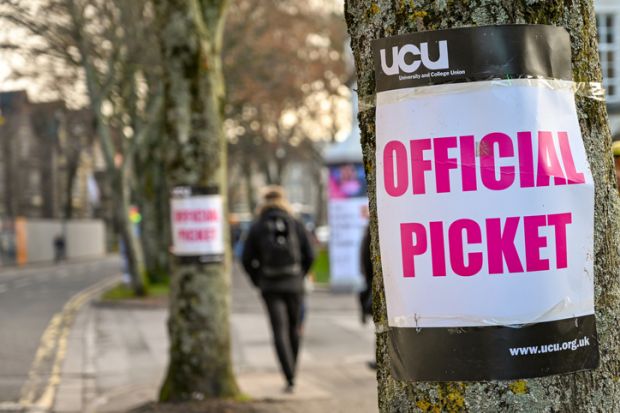Further strikes have been called at several campuses across the UK as tensions escalate over pay deductions for academics refusing to mark students’ work.
With many students still unsure whether they will receive grades for their exams and essays this term – or if they will be able to graduate – the fresh round of strikes generally target university open days, meaning potential new students will also face disruption.
The University and College Union (UCU) branch at the University of Leeds has called an “indefinite strike” from 15 June, with staff calling for threats to dock 100 per cent of boycotters’ pay to be rescinded and for Leeds to follow Cambridge, Sussex and Queen’s University, Belfast in calling for national-level negotiations to restart.
With the other campus union – Unison – also on strike over pay for parts of this period, the university has been warned that open days, marking, exam boards, university conferences and dissertation supervision for master’s students could all be disrupted.
Vicky Blake, widening participation officer at Leeds and former president of UCU, said the deductions were seen as “wildly disproportionate,” given staff were continuing to carry out other duties.
“This does not need to happen, we don’t want this to happen. We have asked the university management to work with us to end the dispute and they have declined so we have been offered no choice,” she said. “We are planning for the long haul but we are pushing for more negotiations.”
A Leeds spokesman it was “working hard to minimise the impact” of the industrial action and that rescheduling and completing any teaching and assessment that is disrupted “must be the priority.”
Elsewhere, the UCU branch at the University of Durham has announced strikes on 16, 17 and 29 June as well as on 15 and 16 September over 50 per cent pay deductions. Staff at the University of Bristol have also been told 50 per cent of their pay will be docked if they do not mark work, and have called a 16 June strike to disrupt an open day in response.
Bristol's branch president Jamie Melrose said: “The vice-chancellor needs to halt the pay docking and call for national negotiations to reopen. Students and staff demand nothing less.”
A spokesperson for the university said the open day would be going ahead as planned, “although we have had to regrettably cancel a small number of sessions.”
“While we are working with our local unions here at Bristol, the sector needs to find affordable solutions and better ways of resolving these ongoing disputes nationally,” they added.
The University of Westminster held a strike over pay deductions on 7 June while SOAS, University of London, the University of Winchester and Sheffield Hallam University have also all been affected.
Raj Jethwa, chief executive of employer body the Universities and Colleges Employers Association, has defended the pay deductions being implemented by most universities.
“Withholding pay from the same staff who usually work hard for their institutions and students is an incredibly difficult thing to do,” he said.
“But not withholding pay would be a far more difficult thing to do. Not withholding pay would be allowing staff to target and impact students negatively without challenge or protection.”
Strikes have proven effective for some. Union members at Liverpool Hope University were offered reduced deductions – from 50 per cent to 35 per cent – and called off their action.
Queen Margaret University in Edinburgh cancelled all planned pay deductions for staff after UCU there called 18 days of strike action.
Elsewhere in Scotland, the University of Dundee branch has held strikes and more are planned at Edinburgh and Heriot Watt universities.
Mary Senior, the Scotland official for UCU, said the wave of strikes was an escalation “to oppose university bosses making punitive and disproportionate pay cuts” that she said were “extremely harsh and unfair”.
She added: “University principals should be getting back to the negotiating table and putting forward a better offer on pay to address the fact that university workers’ pay has dropped by 25 per cent since 2009.”

